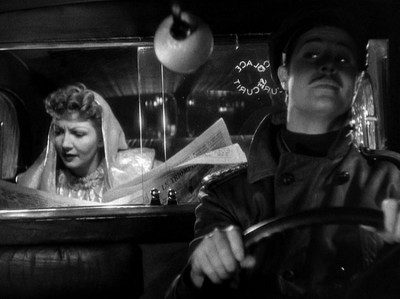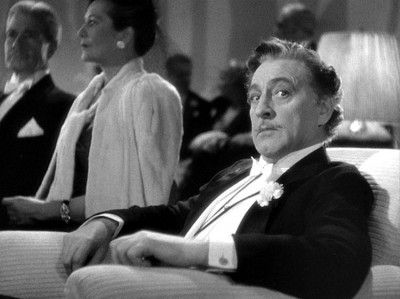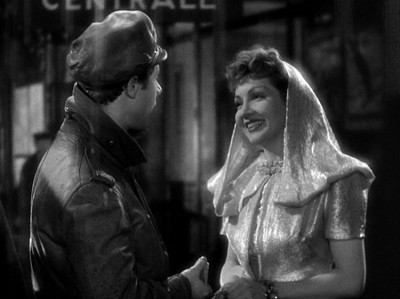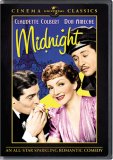| Reviews & Columns |
|
Reviews DVD TV on DVD Blu-ray 4K UHD International DVDs In Theaters Reviews by Studio Video Games Features Collector Series DVDs Easter Egg Database Interviews DVD Talk Radio Feature Articles Columns Anime Talk DVD Savant Horror DVDs The M.O.D. Squad Art House HD Talk Silent DVD
|
DVD Talk Forum |
|
|
| Resources |
|
DVD Price Search Customer Service #'s RCE Info Links |
|
Columns
|
|
|
Midnight (1939)
A delight! Universal, under their Cinema Classics label, has released a plain-wrap edition of director Mitchell Leisen's romantic comedy classic, Midnight, starring Claudette Colbert, Don Ameche, John Barrymore, Francis Lederer and Mary Astor. With a remarkably adroit (and surprisingly sensitive for a "screwball comedy") screenplay by whizzes Charles Brackett and Billy Wilder, 1939's Midnight features one of legendary Colbert's most charming performances, along with further proof that Mitchell Leisen is criminally undervalued when the usual great directors of classic Hollywood are listed.

Colbert plays Eve Peabody, a chorine newly arrived on a miserable, rainy night in Paris, who doesn't have a cent to her name and only the gown on her back and a pawn ticket for possessions. Seeing cabbie Tibor Czerny (Don Ameche), she proposes a deal: he can drive her around to all the nightclubs in town while she tries to land a job, and once she does, she'll pay double his fare - plus, of course, "a great big daddy tip." Tibor, however, isn't convinced and turns her down, until he relents when he sees the hapless Eve trying to stay dry in the downpour. When she's unable to find a job, poor but honest Tibor, who obviously is taken with the gorgeous Eve (who's quite honest about her intentions of finding a wealthy benefactor), offers her a bed at his flat - with no strings attached. She refuses, but he won't take no for an answer - until Eve lams it out of his cab.
Gate-crashing an exclusive party, she narrowly escapes detection, only to get into serious debt with bridge players and snooty aristocrats Helene Flammarion (Mary Astor), playboy Jacques Picot (Francis Lederer) and bon vivant Marcel Renaud (Rex O'Malley). Miraculously, Helene's husband, Georges (John Barrymore) surreptitiously slips her some cash and saves her bacon. Adopting - on the fly - the persona of Baroness Czerny, Eve scrabbles to maintain the façade, even going so far as to let the obviously interested Jacques take her to her non-existent hotel room at The Ritz. But lo and behold - she does have a room there, as well as luggage and a chauffer. How did that come about? Soon, she receives a visit from Georges, and everything is revealed. Aware that his wife is having a fling with Jacques (something Eve witnessed, as well, before the card game), he wants to "bring her back to her senses" by having Eve take Jacques away from her. He'll foot the bill, and she'll get a rich husband while he'll get his wife back in line.
It's a perfect plan for all concerned - until Helene becomes jealous of Jacques' increasing infatuation with the sparkling Eve. Aided by snippy Marcel, she's looking for any excuse to bring down Eve. And the wild card in the bunch is Tibor, who all this time has been organizing the taxi drivers of Paris to hunt down Eve, so he can proclaim his lover for her. When Tibor crashes the exclusive weekend retreat of Georges' and Helene's, Eve's lying and scheming go into overdrive, trying to plug up all the holes in her story until the inevitable happy ending.
SPOILERS ALERT!

Written by the miracle screenwriting team of Charles Brackett and Billy Wilder (Ninotchka, Hold Back the Dawn, The Major and the Minor, Double Indemnity, The Lost Weekend, Sunset Boulevard), and directed by one of my favorite studio artists of the golden age of Hollywood, Mitchell Leisen (Remember the Night, Hold Back the Dawn, Golden Earrings), Midnight is an almost impossibly perfect little confection that we marvel at today, particularly when seen next to the sadly incompetent offal that pass for romantic comedies today (one need go no further than the recent big-screen abortion Over Her Dead Body to see the pitiful state of romantic comedies as cobbled together by talent-starved Hollywood today). A Depression-era, pre-WWII (at least for us) fantasy tale of a tough Bronx cookie looking to get rich by charming and lying her way across Europe - only to stay true to herself and land a nice guy with no dough - Midnight builds inexorably from one set-up to the next, creating an escalating level of comedic tension that's all the more remarkable when you consider how effortless and light the whole affair appears to be on the screen.
With an almost relentless anxiousness, Wilder, Brackett and Leisen put Colbert through her paces as the chorine who digs herself in deeper and deeper with the aristocrats who can't quite get a handle on who Eve really is, but who are ultimately taken in by her superior fibbing and guileful charm. As viewers, we're constantly asking ourselves, "how is she going to get out of this mess," and almost without fail, the filmmakers artfully arrange the chaos into a gossamer of ingenious, infectious fun (I write "almost" because for me, the third act courtroom finale always seems a tad clunky). Of course, the theme of survival by any means (Eve literally has nothing but the clothes on her back when she arrives in strange-land Paris - a stressful situation that former refugee Wilder experienced once) would resonate with Midnight's Depression-era audiences, providing a backbone to the plot that keeps the frolicking grounded.
As well, there's a delicious, adroitly hinted-at (due to the Production code) examination of the politics of sex in Midnight that further deepens its comedy. When Eve and Tibor share their midnight ride among the Paris music halls and cafes, it's clear that Eve is wary of falling in love with the loveable Tibor, precisely because she wants money this time around, not real feelings. Her previous escapade (landing a British Lord, only to take a payoff for deserting him, which she promptly blew at the crap tables in Monte Carlo) only confirmed her desire to settle in with the "In" crowd and land a whale. But Tibor is having none of that, sensing the innate goodness in Eve (which she herself doesn't want to acknowledge), demanding that she go home with him - but not for sex. He wants to care for her. And when she takes a powder and leaves his cab on the sly, he organizes all of the Paris taxi drivers to find her, and even masquerades as her husband, the "Baron Czerny," to save her from humiliation and to get her back.

However, even though she acknowledges what they both know - that Tibor's invitation to stay at his flat, completely innocent as it was, would have led to sex - she still can't commit to being poor. She'd rather stay with the flush Jacques than risk living on 40 francs a day with Tibor. Complicating the audience's response to Eve's rather mercenary actions is the sincerity of Jacques' attentions - a brilliant move on the screenwriters' and director's part. Jacques, who may be a fickle playboy, has true feelings for Eve, which are succinctly summed up when Tibor arrives on the scene. Director Leisen gives us a quick close-up of Jacques looking crestfallen, realizing that the path to Eve isn't clear. It's not a sardonic look, or a comically angry or anxious look, but one of true regret as he drops his head. Midnight takes the time to add honest feeling and depth at other points among the satire (Helene, as well, is genuinely moved to sadness when she realizes the depths of her jealousy over Jacques and Eve), giving Midnight an emotional resonance that's unusual for a "screwball" comedy (a quality director Leisen was able to cultivate in many of his films, particularly the sublime romance Remember the Night, which followed Midnight in 1940).
Equal to the perfectly integrated script is the inspired cast. Ameche has perhaps the easiest role here, and he's quite funny in the final courtroom scene, asking only for water when the judge (Monty Woolley) demands his final statement before reaching a judgment of "divorce" from Eve (even though they're not married). Barrymore, well past his matinee idol days and looking like he's ready to keel over at any moment, is hilariously on-point as the slightly ruffled aristocrat with the continental attitude towards infidelity and marriage (a lax, European attitude towards sex that Wilder, by way of his inspiration Lubitsch, would infuse into most of his later directorial work). His bravura introductory scene, where he wordlessly gets across his suspicion of Eve's intentions, his astonishment at her audacity - and his appreciation of her beauty - is a model of silent film comedy acting. And later, when he's pretending to be Eve's nonexistent child on the phone, his high-pitched screeching steals the show.
And then, of course, there's Claudette Colbert. Tied with Irene Dunne for the perfect romantic comedy actress, no wonder Colbert still entrances women viewers today with her effortless chic, tough-cookie playfulness, and her wicked, naughty flirtatiousness. She's the kind of woman other women wish they were (like Gable for men), with a sophisticated yet down-to-earth plucky humor that makes her instantly adorable (it's not surprising that a similarly-oriented actress, Reese Witherspoon, is remaking Midnight; although quite different from Colbert, she has that same connection/wish fulfillment with her female audience). With her heart-shaped face and little bow mouth, Colbert is like Betty Boop come to life - without the short skirt, the salaciousness and the Brooklyn accent. Able to switch from flirty knowingness (watch her chuckle ruefully before trying to put the bite on Tibor when they first meet), to zany comedy, to touching, emotional scenes, Colbert is a wonder here in Midnight, and the very embodiment of Leisen's, Wilder's and Brackett's chic, witty, and tender fantasy world.

The DVD:
The Video:
Presented in its original 1.33:1, full-frame aspect ratio, Midnight looks quite good here, with deep, velvety blacks that hold, and a sharpish picture. Grain is apparent (and inevitable) at times, but the print used is almost free of scratches or other anomalies.
The Audio:
The Dolby Digital English audio mix is a spilt 2.0 mono, which is just fine for such a feature. All dialogue is crisply heard, with English subtitles available.
The Extras:
Other than the original theatrical trailer, and a brief introduction from TCM's Robert Osborne (which is innocuous enough), there are no extras for Midnight.
Final Thoughts:
A sparkling champagne concoction of continental sexual hijinks, wacky screwball farce, and tender love story, Midnight is one of the true classics of the romantic comedy genre, and a brilliant showcase for the incomparable Claudette Colbert. I would have preferred at least some kind of featurette or documentary on either the film or the stars - as befitting such a prominent film in the genre - but at least the print looks nice. I highly recommend Midnight.
Paul Mavis is an internationally published film and television historian, a member of the Online Film Critics Society, and the author of The Espionage Filmography.


|
| Popular Reviews |
| Sponsored Links |
|
|
| Sponsored Links |
|
|
| Release List | Reviews | Shop | Newsletter | Forum | DVD Giveaways | Blu-Ray | Advertise |
|
Copyright 2024 DVDTalk.com All Rights Reserved. Legal Info, Privacy Policy, Terms of Use,
Manage Preferences,
Your Privacy Choices | |||||||














